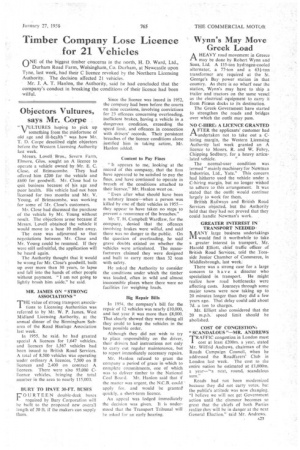Timber Company Lose Licence for 21 Vehicles
Page 27

If you've noticed an error in this article please click here to report it so we can fix it.
ONE of the biggest timber concerns in the north, H. D. Ward, Ltd., Durham Road Farm, Wolsingharne Co. Durham, at Newcastle upon Tyne, last week, had their C licence revoked by the Northern Licensing Authority. The decision affected 21 vehicles.
Mr. J. A. T. Hanlon, the Authority, said he had concluded that the company's conduct in breaking the conditions of their licence had been wilful.
Since the licence was issued in 1952, the company had been before the courts on nine occasions, involving convictions for 23 offences concerning overloading, inefficient brakes, having a vehicle in ,a dangerous condition, exceeding the speed limit, and offences in connection with drivers' records. Their persistent breaches of the licence conditions alone -justified him in taking action, Mr. Hanlon added.
Content to Pay Fines
"It appears to Me, lookingat the record of this company, that the firm have appeared to be satisfied to pay the fines, and have continued to operate in breach of the conditions attached to their licence," Mr. Hanlon went on.
Even after what should have been a salutary lesson----when a person was killed by one of their vehicles in 1955-they appear to have taken no steps to prevent a recurrence of the breaches."
Mr. T. H. Campbell Wardlaw, for the company, denied that the offences involving brakes were wilful, and said there was no danger to the public. On the question of overloading, he said grave doubts existed on whether the vehicles were articulated. The manufacturers claimed they were designed and built to carry more than 32 tons with safety.
He asked the Authority to consider the conditions under which the timber was loaded, often in wild and almost inaccessible places where there were no facilities for weighing loads.
Big Repair Bills In 1954, the company's bill for the repair of 12 vehicles was nearly £10,000, and last year it was more than £8,000. That clearly showed they were doing all they could to keep the vehicles in the best possible order.
Although they did not wish to try to place responsibility on the driver, their drivers had instructions not only to carry out regular maintenance, but to report immediately necessary repairs.
Mr. Hanlon refused to grant the company a period of grace in -which to complete commitments, one of which was to deliver timber to the National Coal Board. Mr. Hanlon said that if the matter was urgent, the N.C.B. could apply for, and would be granted' quickly, a short-term licence.
An appeal was lodged immediately the decision was given. It is understood that the Transport Tribunal will he asked for an early hearing.




































































